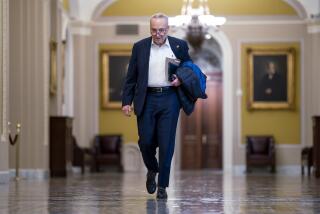Senators Hopeful of Progress at Summit Despite U.S.-Soviet Chill
- Share via
WASHINGTON — Leaders of a U.S. Senate delegation that is visiting Moscow said Sunday that they are hopeful of progress at the November summit between President Reagan and Soviet leader Mikhail S. Gorbachev, despite the chill in U.S.-Soviet relations.
Senate Minority Leader Robert C. Byrd (D-W.Va.) and Sen. John W. Warner (R-Va.) made their comments before the disclosure of an interview in which Gorbachev called tension between the superpowers “explosive.” Nevertheless, both senators, speaking for themselves and six colleagues on ABC-TV’s “This Week with David Brinkley,” emphasized that the world’s fate hangs on progress toward nuclear disarmament.
Warner said he hopes that the delegation will meet with Soviet officials to discuss human rights, “Star Wars” research on space-based nuclear defenses and other points of controversy between Washington and Moscow. Meanwhile, he said he remains hopeful about the summit.
“You can look at the history of summitry and cast doubt on it, but you can’t cast doubt on the proliferation of nuclear technology, particularly as it relates to weapons and the enormous arsenals that both nations have now amassed,” Warner said.
“The whole world is now held at bay by virtue of these ever-expanding nuclear arsenals. And if we can begin to lower the level of the arsenals--that is, substantial reductions on both sides--in a fair, equitable, verifiable and I would like to add, enforceable, arms agreement, then I think there will be a great reassurance spread across this Earth,” Warner added.
Hope for ‘Some’ Results
In Byrd’s view, “if the leaders will simply sit down and talk, we ought to have some results out of the forthcoming summit and the Geneva (arms control) talks.”
Byrd brushed aside Soviet charges that the Reagan Administration has sabotaged the summit by scheduling a test of an anti-satellite weapon.
“That test was announced (by the United States),” the Democratic leader replied. “I don’t think ‘spy dust’ was announced (by the Soviet Union).” The latter reference was to a chemical powder that the State Department has charged was used by Soviet secret police to trace the movements of U.S. diplomats in Moscow--at possible risk to the health of those touching the substance.
“These episodes, like ‘spy dust,’ are just the kind of things that sour the atmosphere,” Byrd said. “It’s time we sit down and be serious, because we are dealing with the fate of all mankind.”
‘Distorted Picture’
Gennadi I. Gerasimov, a commentator with the Soviet news agency, Novosti, in an earlier segment of the Brinkley program, expressed concern at the state of U.S.-Soviet relations and accused the Reagan Administration of portraying a “distorted picture” of his country. Gerasimov said he hopes for positive results from the Geneva summit and urged Americans not to think of his countrymen as enemies.
“Maybe we are also partners, and not just partners in a suicide pact,” Gerasimov said.
The same note was struck by William G. Hyland, a former CIA official, a staff expert with the National Security Council under President Gerald R. Ford and now the editor of Foreign Affairs quarterly. He applauded the President’s decision to meet with Gorbachev but said that the summit should not be undertaken as only a “public relations exercise.”
“If it is a PR campaign, there will be no winners,” Hyland said.
More to Read
Sign up for Essential California
The most important California stories and recommendations in your inbox every morning.
You may occasionally receive promotional content from the Los Angeles Times.













